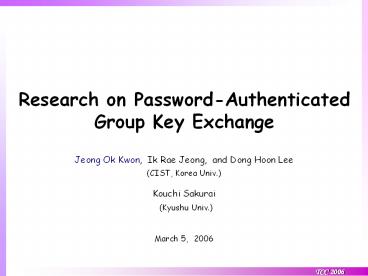Research on Password-Authenticated Group Key Exchange - PowerPoint PPT Presentation
Title:
Research on Password-Authenticated Group Key Exchange
Description:
Jeong Ok Kwon, Ik Rae Jeong, and Dong Hoon Lee (CIST, Korea Univ.) Kouchi Sakurai ... A fundamental problem in cryptography is how to communicate securely over ... – PowerPoint PPT presentation
Number of Views:151
Avg rating:3.0/5.0
Title: Research on Password-Authenticated Group Key Exchange
1
Research on Password-Authenticated Group Key
Exchange
Jeong Ok Kwon, Ik Rae Jeong, and Dong Hoon Lee
(CIST, Korea Univ.) Kouchi Sakurai
(Kyushu Univ.) March 5, 2006
2
Motivation
- A fundamental problem in cryptography is how to
communicate securely over an insecure channel.
3
Motivation
- How can we obtain a secret session key?
- Public-key encryption or signature
- too high for certain applications
- Password-Authenticated Key Exchange (PAKE)
- PAKE allows to share a secret key between
specified parties using just a human-memorable
password. - convenience, mobility, and less hardware
requirement - no security infrastructure
4
Classification of PAKE
5
Our research topic on PAKE
- Password-Authenticated Group Key Exchange
(PAGKE) -
6
PAGKE Setting
- A broadcast group consisting of a set of users
- each user holds a low-entropy secret (pw)
Group with sk
7
Previous Works
- Efficient Password-Based Group Key Exchange
(Trust-Bus 04) - S. M. Lee, J. Y. Hwang, and D.
H. Lee. - a provably secure constant-round PAGKE protocol
- forward-secure and secure against known-key
attacks - ideal-cipher and ideal-hash assumptions
- Password-based Group Key Exchange in a Constant
Number of Rounds (PKC 06) - Abdalla, E.
Bresson, O. Chevassut, and D. Pointcheval. - a provably secure constant-round PAGKE protocol
- secure against known-key attacks
- ideal-cipher and ideal-hash assumptions
8
Our Goal
- The focus of this work is to provide a
provably-secure constant-round PAGKE protocol
without using the random oracle model.
9
Preliminary for protocol
- Public information
- G a finite cyclic group has order q
- p a safe prime such that p2q1
- g1,g2 generators of G
- H a one-way hash function
- F a pseudo random function family
10
Burmester and Desmedts Protocol
U1
U2
U3
U4
R1
R2
M. Burmester and Y. Desmedt. A Secure and
Efficient Conference Key Distribution System, In
Proc. of EUROCRYPT 94.
11
Protocol
U1
U2
U3
U4
R1
R2
12
Security Measurement
- Security theorem
- where t is the maximum total game time
including an adversarys running time, and an
adversary makes qex execute-queries, qse
send-queries. n is the upper bound of the number
of the parties in the game, Ns is the upper bound
of the number of sessions that an adversary
makes, PW is the size of a password space. - Under the intractability assumption of the DDH
problem and if F is a secure pseudo random
function family, the proposed protocol is secure
against dictionary attacks and known-key attacks,
and provides forward secrecy.
13
- Thank you !
Jeong Ok Kwon (pitapat_at_korea.ac.kr)






























